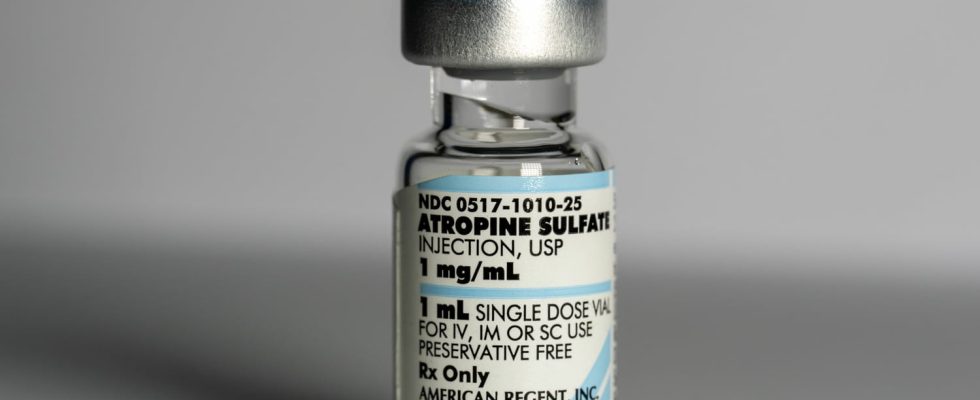Atropine Alcon® (eye drops), Atropine sulfate Lavoisier® (injection)… Atropine is a substance belonging to the class of alkaloids. Among its indications: heart problems or vision alterations.
What is the role of atropine?
Atropine is a toxic substance belonging to the class of alkaloids. It is obtained from a molecule present in certain plants of the Solanaceae family such as belladonna, datura, mandrake or henbane. In the form of salt (atropine sulphate), it is used as anticholinergic drug in certain emergency situations, preoperatively before anesthesia or in the context of surgery as well as as an antidote to certain toxic substances (gas, pesticides, organophosphates).
What is the mode of action of atropine?
Atropine is a anticholinergic substance that is to say, she blocks muscarinic acetylcholine receptors in the central and peripheral nervous system. It prevents the actions of this neurotransmitter in the body. The resulting effects are: cessation of certain secretions (sweat, saliva, bronchial mucus, etc.), vagus nerve inhibition (tachycardia, dilation of the pupil, paralysis of accommodation of the lens also called cycloplegia), the relaxation of smooth muscles (particularly bronchial and intestinal), excitement, delusions, depression. When used in large doses, atropine first excites the central nervous system before paralyzing it.
What are the indications for atropine?
Atropine may be indicated in emergency situations in case of cardiac disorders such as arrhythmias (atrioventricular blocks) or slow heart rate (sinus and vagal bradycardia), as well as in hepatic colic, renal colic, spasmodic pain in the digestive tract, acute poisoning by anticholinesterases or parasympathomimetics (examples: poisoning with nerve gases, mushrooms, etc.), in the management of amblyopia (degradation of sight), in the cycloplegia (medicinal paralysis of accommodation and causing dilation of the pupil, a technique used to carry out eye examinations) or in the event of uveitis. Atropine is also used as part of a premedication before general anesthesia or to avoid adverse effects of certain medications during surgery.
Which drugs contain atropine?
Atropine is present in eye drops (ex: Atropine Alcon®)injectable solutions (e.g.: Atropine sulfate Lavoisier®) and in combination with other active ingredients as in Ineurope®.
When to take atropine injection?
Injectable atropine is indicated in the treatment of heart trouble (medical emergencies) such as atrioventricular blocks, sinus and vagal bradycardia, as well as in the management of hepatic colic, renal colic, spasmodic digestive pain or even acute poisoning by anticholinesterases or parasympathomimetics.
When to take atropine eye drops?
In the form of eye drops, atropine is used in the management of amblyopia (changes in vision), cycloplegia (drug technique to prevent accommodation and dilate the pupil in order to perform eye exams), keratitisof the uveitis and iridocyclitis (inflammatory reactions of the uvea and iris).
What is the dosage of atropine?
Atropine in eye drops is dosed at 0.3%, 0.5% or 1%. Atropine injection is dosed at 0.1, 0.2, 0.25, 0.5, 1 or 2 mg/ml according to business specialties.
What are the side effects of atropine?
The most common side effects are visual disturbances (dilated pupils, blurred vision, intolerance to light), a decrease in bronchial and gastric secretionsof the dry mouth (with difficulty swallowing or speaking and feeling thirsty), decrease in sweating, of the digestive disorders (constipation, heartburn, nausea, vomiting, bloating), uloss of taste, skin dryness and rashes (or hives). Other effects may also occur, especially with higher doses, such as excitement, coordination problems, confusion, hallucinations, increased body temperature, heart problems (tachycardia, arrhythmias, bradycardia), facial flushing and difficulty urinating. More rarely have been referenced psychotic reactions, allergic reactions, epileptic seizures, drowsiness, severe allergies, ventricular fibrillation, chest pain or a rapid increase in blood pressure.
What are the contraindications of atropine?
The contraindications of atropine do not apply in cases where its use is in a life-threatening situation. Atropine is contraindicated in hypersensitivity to atropine or to any of the excipients contained in the medicinal product. It is also contraindicated in case of history of angle closure glaucomain case of difficulty urinating (urinary retention linked to urethro-prostatic disorders), disease of the esophagus, blockage of the intestine (paralytic ileus), distention of the colon (toxic megacolon) or during breastfeeding. Caution should be exercised in case prostate hypertrophy, kidney or liver failure, heart failure, arrhythmias or hyperthyroidism, COPD (chronic obstructive pulmonary disease), pyloric stenosis (stomach), fever (or high ambient temperature). Caution is also required in echildren and the elderly, who are more susceptible to adverse effects.
